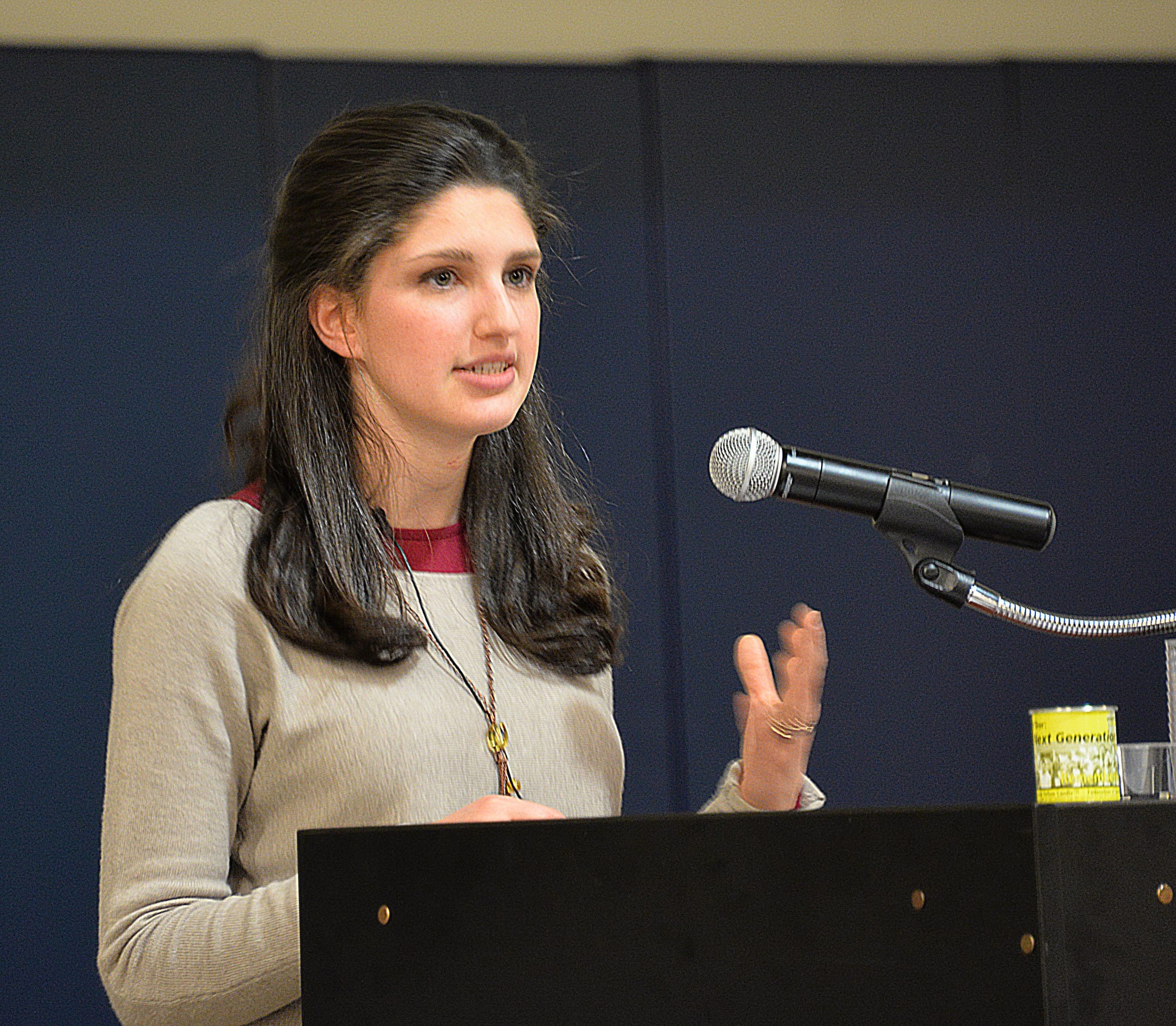Remembering the Holocaust, Seventy Years Later
Touro College commemorates Yom HaShoah with reflections from multiple generations.

“The scene was surreal: a line of black shadows trudging through the snowy darkness,” began Orly Gross, LCW ’15, to a hushed audience as she described her experience visiting Auschwitz with her grandfather, a survivor. “It was eerily reminiscent of an earlier march, 70 years prior,” continued Orly, “but last time they were surrounded by Germans, clubs, barking dogs. This time, each person held a flickering candle.”
Touro College’s Lander College for Women—The Anna Ruth and Mark Hasten School (LCW), and Institute on Human Rights and the Holocaust, hosted “Commemorating Yom HaShoah: A 70-Year Perspective.” Emceed by Professor Anne Bayefsky, director of the Institute on Human Rights and the Holocaust, the program featured a line-up of presentations from six speakers who each reflected on another aspect of World War II.
Ruth Zimbler set the stage as she spoke about her life in Vienna before the war, describing how government rights were gradually stripped away from Jews. “When my library privileges were taken from me, as a ten-year-old…to this day, it still hurts,” she said. Her voice was somber as she spoke about watching the majestic synagogue she attended burn down in front of her eyes on Kristallnacht. Eventually, Ruth travelled to den Haag, Holland on the first Kindertransport out of Vienna.
Survivor Baruch Gross, from Slovakia, recounted his experience hiding in an attic with his father and brothers. The day he cautiously left the hiding place to see whether it was safe for all of them to reemerge, he was caught by an SS officer and sent to a concentration camp and eventually transferred to Auschwitz. Gross described being marched out of the cattle car, running, the thousands of people, the Mengele selection. “When we were taken out of the cattle cars, I saw an old-timer there, with a striped uniform. I asked him where we were. He used an expression from the Hagadah: ‘Dam, va’eish, v’simrot ashan—blood, fire and smoke.’”
After enduring starvation and beatings for a year, Gross was liberated from Buchenwald in April 1945. He spent seven weeks waiting in Buchenwald after liberation until he got a ride with an American military truck back to Czechoslovakia. From there, it was a six-day-long trek to his hometown, during which he alternated between walking and hitchhiking. Upon returning home, he faced tragedy: The majority of his immediate and extended family had been killed, including his father and brother who had died on a death march just weeks before.
Following her grandfather’s speech, Orly Gross illustrated the significance of, and urgency in, hearing survivors’ testimonies firsthand—comparing it to the experience of driving down the highway, trying to follow a car two vehicles ahead of you.
“Despite the static—the vehicle between you and the first car—you have to struggle to maintain the right direction,” she said. “That’s the experience of third-generation Holocaust survivors.”
Members of Touro College leadership also shared their reflections. Dr. Mark Hasten, Chairman of the Board of Trustees, recounted his dramatic story of fighting with the Polish Brigade against the Nazis and liberating Majdanek. After the war, he joined the IDF and fought for Israel as a soldier in the War of Independence. President and CEO Dr. Alan Kadish demonstrated how important it is to remember the words “never again” in passing on the lessons of the Holocaust to the next generation.
For the last talk of the evening, Morton A. Klein, the son of Holocaust survivors and the president of the Zionist Organization of America, passionately connected the past to contemporary politics.
“In the years leading up to the Holocaust, the world ignored Hitler's public threats to the Jews,” said Klein, who was born in a DP camp. “Today, the world is essentially ignoring the weekly threats by Iran to annihilate the Jewish state. We were ignoring threats in the 30s, and we're ignoring them again in 2015. It’s a frightening catastrophe in the making…Khomeini is the Hitler of our time.”
In closing, LCW Dean Dr. Marian Stoltz-Loike left attendees a message for moving forward. “The Holocaust teaches us to think critically at what educated humans did to other humans, and to reflect on what that means for us. So I challenge everyone in the room to think: When you leave this room, what will each of you do to make this world a better place?”
The event was sponsored by Professor Anne Bayefsky, Director of the Touro Institute on Human Rights and the Holocaust, Dr. Marian Stoltz-Loike, Dean of LCW, Dean Donne Kampel of the Women’s Leadership Council, and the Upper West Side Carlebach Shul.

